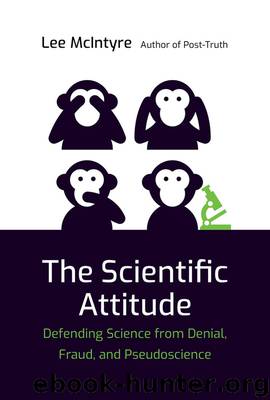The Scientific Attitude by Lee McIntyre

Author:Lee McIntyre
Language: eng
Format: epub
Tags: Philosophy of science; philosophy; science; scientific attitude; scientific method; empirical; evidence; Karl Popper; Thomas Kuhn; methodology; demarcation; denial; denialism; denier; science denial; science denier; warrant; epistemology; pseudoscience; fraud; social science; natural science; method; theory; truth; true; post-truth; certainty; proof; induction; scientism; skeptic; scepticism; climate change; global warming; vaccines; evolution; logic; values; justification; knowledge; valid; falsifiable; falsification; objectivity; subjectivity; objective; subjective; special; distinctive; understanding; explanation; failure; medicine; medical
Publisher: The MIT Press
6 How the Scientific Attitude Transformed Modern Medicine
It is easy to appreciate the difference that the scientific attitude can make in transforming a previously undisciplined field into one of scientific rigor, for we have the example of modern medicine. Prior to the twentieth century, the practice of medicine was based largely on hunches, folk wisdom, and trial and error. Large-scale experiments were unknown and data were difficult to gather. Indeed, even the idea that one needed to test one’s hypotheses against empirical evidence was rare. All of this changed within a relatively short period of time after the germ theory of disease in the 1860s and its translation into clinical practice in the early twentieth century.1
We already saw in chapter 1 how Ignaz Semmelweis’s discovery of the cause of childbed fever in 1846 provides a prime example of what it means to have the scientific attitude. We also saw that he was far ahead of his time and that his ideas were met with unreasoned opposition. The scientific attitude that Semmelweis embraced, however, eventually found fruition throughout medicine. At about the same time as Semmelweis’s work, medicine saw the first public demonstration of anesthesia. For the first time, surgeons could take their time doing operations, as they no longer had to wrestle down fully awake patients who were screaming in pain. This did not in and of itself allow for lower mortality, as one complicating factor from lengthened surgeries was that patients also had more time for their wounds to be open to the air and get infected.2 Only after Pasteur discovered bacteria and Koch detailed the process of sterilization did the germ theory of disease begin to take root. When Lister introduced antiseptic techniques (which kill the germs) and aseptic surgery (which prevents the germs from entering in the first place) in 1867, it was finally possible to keep the cure from sometimes being worse than the disease.3
From today’s point of view, it is easy to take these advances for granted and underappreciate how they led to the growth of better quantitative techniques, laboratory analysis, controlled experimentation, and the idea that diagnosis and treatment should be based on evidence rather than intuition. But one should not forget that Western medicine has always fancied itself to be scientific; it is just that the meaning of the term has changed.4 Astrological medicine and bloodletting were once considered cutting edge, based on the highest principles of rationality and experience. One would be hard pressed to find any eighteenth-century doctor—or I imagine even one in the early Greek era—who did not consider his knowledge “scientific.”5 How can one claim, then, that these early physicians and practitioners were so woefully benighted? As we have seen, such things are judged by the members who make up one’s profession and so are relative to the standards of the age—but according to the standards of the early nineteenth-century, bloodletting seemed just fine.
My goal in this chapter is not to disparage the beliefs of any particular period, even as
Download
This site does not store any files on its server. We only index and link to content provided by other sites. Please contact the content providers to delete copyright contents if any and email us, we'll remove relevant links or contents immediately.
Enlightenment Now: The Case for Reason, Science, Humanism, and Progress by Steven Pinker(7306)
A Journey Through Charms and Defence Against the Dark Arts (Harry Potter: A Journey Through…) by Pottermore Publishing(4811)
The Immortal Life of Henrietta Lacks by Rebecca Skloot(4581)
A Journey Through Divination and Astronomy by Publishing Pottermore(4380)
Elon Musk by Ashlee Vance(4122)
Origin Story: A Big History of Everything by David Christian(3688)
COSMOS by Carl Sagan(3618)
Alchemy and Alchemists by C. J. S. Thompson(3516)
Bad Pharma by Ben Goldacre(3422)
Enlightenment Now by Steven Pinker(3367)
Shadow of Night by Deborah Harkness(3361)
Inferior by Angela Saini(3311)
A Mind For Numbers: How to Excel at Math and Science (Even If You Flunked Algebra) by Barbara Oakley(3302)
Origin Story by David Christian(3195)
The Code Book by Simon Singh(3181)
Signature in the Cell: DNA and the Evidence for Intelligent Design by Stephen C. Meyer(3132)
The Elements by Theodore Gray(3051)
A Brief History of Time by Stephen Hawking(3022)
A Journey Through Potions and Herbology (A Journey Through…) by Pottermore Publishing(2852)
